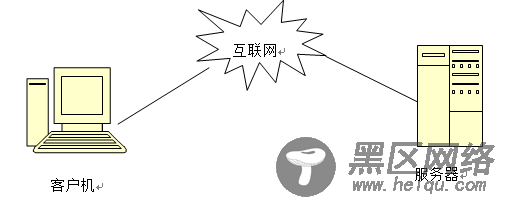/* Connect the socket */
if (connect(s, (struct sockaddr *)&sin, sizeof(sin)) < 0)
errexit("can't connect to %s.%s: %s\n", host, service,
strerror(errno));
return s;
}
int connectUDP(const char *host, const char *service){
return connectsock(host,service,"udp");
}
四、针对TIME服务的UDP服务器端软件的实现
1.网络拓扑结构:

2.源码:
#include <stdio.h>
#include <stdlib.h>
#include <unistd.h>
#include <string.h>
#include <stdarg.h>
#include <sys/types.h>
#include <sys/socket.h>
#include <netinet/in.h>
#include <arpa/inet.h>
#include <netdb.h>
#include <errno.h>
#define UNIXEPOCH 2208988800UL
extern int errno;
unsigned short portbase = 0;
int errexit(const char *format,...);
int passivesock(const char *service, const char *transport, int qlen);
int passiveUDP(const char *service);
int main(int argc, char *argv[]){
char *service= "time";
struct sockaddr_in fsin;
char buf[1];
int sock;
time_t now;
unsigned int alen;
switch(argc){
case 1:
break;
case 2:
service=argv[1];
break;
default:
errexit("usage: UDPtimed [port]\n");
}
sock=passiveUDP(service);
while(1){
alen=sizeof(fsin);
if(recvfrom(sock,buf,sizeof(buf),0,(struct sockaddr *)&fsin,&alen)<0)
errexit("recvfrom: %s\n",strerror(errno));
(void)time(&now);
now=htonl((unsigned long)(now+UNIXEPOCH));
(void)sendto(sock,(char*)&now,sizeof(now),0,(struct sockaddr *)&fsin,sizeof(fsin));
}
}
int errexit(const char *format,...){
va_list arg;
va_start(arg, format);
vfprintf(stderr,format,arg);
va_end(arg);
exit(1);
}
int passivesock(const char *service, const char *transport, int qlen)
/*
* Arguments:
* service - service associated with the desired port
* transport - transport protocol to use ("tcp" or "udp")
* qlen - maximum server request queue length
*/
{
struct servent*pse;/* pointer to service information entry*/
struct protoent *ppe;/* pointer to protocol information entry*/
struct sockaddr_in sin;/* an Internet endpoint address*/
int s, type;/* socket descriptor and socket type*/
memset(&sin, 0, sizeof(sin));
sin.sin_family = AF_INET;
sin.sin_addr.s_addr = INADDR_ANY;
/* Map service name to port number */
if ( pse = getservbyname(service, transport) )
sin.sin_port = htons(ntohs((unsigned short)pse->s_port)+ portbase);
else
if ((sin.sin_port=htons((unsigned short)atoi(service)+portbase)) == 0)
errexit("can't create passive service %d \n",sin.sin_port);
/* Map protocol name to protocol number */
if ( (ppe = getprotobyname(transport)) == 0)
errexit("can't get \"%s\" protocol entry\n", transport);
/* Use protocol to choose a socket type */
if (strcmp(transport, "udp") == 0)
type = SOCK_DGRAM;
else
type = SOCK_STREAM;
/* Allocate a socket */
s = socket(PF_INET, type, ppe->p_proto);
if (s < 0)
errexit("can't create socket: %s\n", strerror(errno));
/* Bind the socket */
if (bind(s, (struct sockaddr *)&sin, sizeof(sin)) < 0)
errexit("can't bind to %s port: %s\n", service,
strerror(errno));
if (type == SOCK_STREAM && listen(s, qlen) < 0)
errexit("can't listen on %s port: %s\n", service,
strerror(errno));
return s;
}
int passiveUDP(const char *service){
return passivesock(service,"udp",0);
}
这里是用的我实验时的代码,前两个是关于echo服务的客户端与服务器端,有下面运行截图:

后两个是关于time服务的,有下面运行截图:


